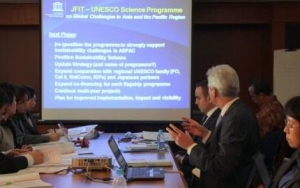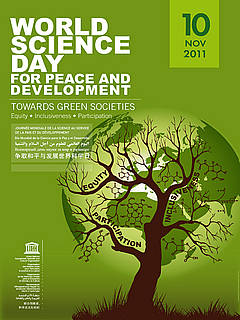Natural Sciences
Introduction
UNESCO Office in Jakarta is the UNESCO Regional Science Bureau for Asia and the Pacific region as well as the UNESCO Cluster Office for Indonesia, Malaysia, Philippines and Timor Leste. UNESCO Office in Jakarta contributes to the international effort in addressing issues of sustainable development and pursues the Millennium Development Goals (MDGs) through its Science Programmes by working closely with the Member States, international and regional institutions and NGOs.
Natural Sciences sub-themes:
- Basic Sciences
- Sciences for Society
- Earth Sciences
- Engineering Sciences & Technology
- People, Biodiversity and Ecology
- Water Sciences
- Disaster Risk Reduction
UNESCO`s Programmes on environment and sustainable development: UNESCO began sounding the alarm over the need for a sustainable development in 1968 by organizing a groundbreaking conference questioning our unbridled exploitation of nature. Since then, UNESCO has developed several international scientific programmes to better understanding and managing the Earth`s resources. These programmes are playing important role in Asia and the Pacific region.
International Hydrological Programme (IHP): IHP aims at providing scientific knowledge, technical training and policy advice required to manage this precious resource of water efficiently, fairly and environmentally. IHP is increasingly involved in developing tools and strategties to prevent water conflicts from eruptiong between and within states.
Man and the Biosphere (MAB) Programme: The MAB Programme was established in 1971 and has currently around 130 member countries worldwide. Most of these countries are in Asia and the Pacific. MAB has developed a Worldwide Network of Biosphere Reserves since 1976 which now has some 430 sites as UNESCO Biosphere Reserves list. Biosphere Reserves are special places for people and nature, representing a majority of the world`s terrestrial and coastal ecosystems. Each biosphere Reserve acts like a `living laboratory` that tests ways of managing natural resources while fostering economic and social development.
International Geological Correlation Programme (IGCP): With the help of the International Union of Geological Sciences, scientists in more than 150 countries are improving techniques to assess energy and mineral resources while expanding the knowledge base of the Earth`s geological processes and reducing the risk of natural disasters in developing countries.
Asia Pacific Gender Equity in Science and Technology (APGEST): The APGEST is a breakthrough initiative on gender. The objective of this programme is to promote the adoption of policies and programmes that ensure access to Science and Technology by poor women in the Asia Pacific.
Natural World Heritage: The Natural World Heritage is the priceless and irreplaceable possessions that belongs not only to each nation, but also to all humanity. Part of this heritage of humanity is considered to be of outstanding universal value and as such worth of special protection.
News
- 25-02-2013
Courtesy Visit of the Director and Representative of UNESCO Office Jakarta to the Ministry of Research and Technology, 22 February 2013
More

- 28-05-2012








